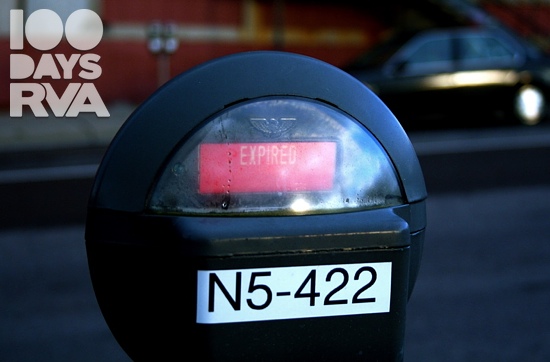Day #011: Smart parking meters
Should a lawyer have to move her car every two hours if she’s willing to pay the city $20 per day for front row, on-street parking?

Inspired by Michael Bierut’s 100 Day Project, 100 Days to a Better RVA strives to introduce and investigate unique ideas to improving the city of Richmond. View the entire project here and [the intro here.] (http://rvanews.com/features/introducing-100-days-to-a-better-rva/114345).
- Idea: Smart parking meters that have variable prices based on demand.
- Difficulty: 3 — Change has huge consequences since our society has been built around an addiction to the automobile.
After 70-plus years of unbelievable subsidies and auto-centric policy, we now live in an America addicted to the automobile. There are 253 million cars and trucks on the road, and they all have to go somewhere. In Richmond, many of them go on the street.
Public assets should be used in one of two ways: to benefit all citizens equally with equal access or to generate maximum revenue that benefits all citizens.
On-street parking in Richmond sits in-between these two goals, and it has unmet potential. Tomorrow, I’ll focus on parking in residential areas. Today’s focus will be on parking in commercial areas and the area around Virginia Commonwealth University.
Consumers only pay a fraction of the true cost of parking. In addition to construction and maintenance costs, the area used for parking has an opportunity cost–it could be turned into tax generating real-estate, non-traditional parks, or bike lanes. Instead the space is often given away for free.
Currently the city favors using very few meters, lots of one and two-hour parking signs, and parking tickets to maintain open spots, promote turnover, and generate revenue. Revenue is generated through highly inconvenient parking tickets collected by Standard Parking who have a 5-year $15 million contract with the city.
Regardless of what individuals are doing or how much they value the ability to park their car on the street, they are forced to regularly move their cars. Good parking spots are doled out based on luck and time spent driving around, and buyers with the highest marginal value are ignored.
Instead, the city should up the number of meters in high demand areas and have rates that increase based on demand. For example, meters near campus during class would register very high prices in line with or exceeding the cost of parking garages. Further from campus where demand is lower, costs would be lower. People who place a lower value on proximity or whose time is worth less would park here. In middle of the night in July, parking would be free.
Few things in this city leave a bitter taste in the mouths of residents quite like seeing a little green envelope on a car windshield. Instead, this system will at least allow people to pay for what they get.
This plan is not without its problems: how can drivers predict the cost of spots ahead of time while they are driving in their cars? Technology may offer some solutions but it is still a question that requires answers.
Another concern is parking is considered to be a regressive tax: it disproportionately affects people with lower incomes.
The American Automobile Association estimates driving a sedan costs $9,122 per year on average to the driver. In The Elephant in the Bedroom: Automobile Dependence and Denial, Stanley Hart and Alvin Spivak estimate that government subsidies total $5,000 per car per year or the equivalent of a $3.50 per gallon gas tax.
Maybe parking meters are regressive, but if it generates high revenues then their use can be highly progressive: revenue from parking could be ear-marked for public transportation or walking/biking infrastructure.
Our society takes the financing of driving and parking for granted, but it shapes nearly every aspect of our lives. It’s time to make some consumers realize a small fraction of their cost to society while generating large amounts of revenue that can benefit society as a whole.
Love this idea? Think it’s terrible? Have one that’s ten times better? Head over to the 100 Days to a Better RVA Facebook page and join in the conversation.
Photo by: Tony Webster
-
Recommend this
on Facebook -

Report an error
-

Subscribe to our
Weekly Digest





There are no reader comments. Add yours.